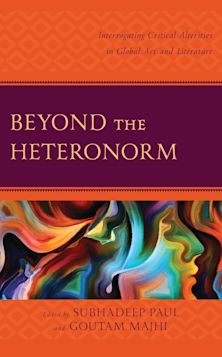- Home
- ACADEMIC
- Gender & Sexuality Studies
- Gender and Sexuality Studies - Other
- Sex, Desire, and Taboo in South Asia
Sex, Desire, and Taboo in South Asia
Religion, Culture of Ability, and Patriarchy
Sex, Desire, and Taboo in South Asia
Religion, Culture of Ability, and Patriarchy
This product is usually dispatched within 1 week
- Delivery and returns info
-
Free CA delivery on orders $40 or over
You must sign in to add this item to your wishlist. Please sign in or create an account
Description
Sex, Desire, and Taboo in South Asia: Religion, Culture of Ability, and Patriarchy explores the intersection of religion, culture of ability, and patriarchy in relation to sex, desire, and taboo. Divided into six chapters, this book utilizes Western theorists such as Foucault and Freud in conjunction with Spivak's theory of the subaltern to establish a theoretical context on sexuality. Through this lens, Acharya evaluates the intersection between religion, patriarchy, and gender and their impact on the perception of sex and desire as a taboo within a South Asian context. The book also examines how individuals contend with their sexual desires, using literature and social media to display the stark difference between the cultural promotion of antisexualism and existing ancient texts on the art of erotica, such as the Kamasutra. In doing so, Sex, Desire, and Taboo in South Asia expands on Eurocentric notions of sexuality and addresses the conditions of the subaltern to explore the complex dynamics of sex in South Asia.
Table of Contents
Chapter Two: Introduction to Sex and Erotica
Chapter Three: Discourse of Sex in South Asia
Chapter Four: Perception and Patriarchy
Chapter Five: Religion, Patriarchy and Gender
Chapter Six: Existing Research and Significance of Sex
Product details
| Published | Jul 12 2024 |
|---|---|
| Format | Hardback |
| Edition | 1st |
| Extent | 230 |
| ISBN | 9781666957198 |
| Imprint | Lexington Books |
| Illustrations | 4 BW Illustrations, 6 Tables, 1 BW Photo |
| Dimensions | 237 x 158 mm |
| Publisher | Bloomsbury Publishing |
About the contributors
Reviews
-
Overall, Sex, Desire, and Taboo in South Asia is a compelling exploration of the cultural and societal factors that shape attitudes toward sex in the region. It challenges readers to reflect on the contradictions and biases within their own societies, offering a nuanced perspective on the complex interplay between religion, culture, and patriarchy. By advocating for education and greater awareness, the book provides a hopeful vision for addressing these deeply ingrained taboos and fostering a healthier understanding of sexuality.
Republica
-
Sex, Desire, and Taboo in South Asia is a provocative and timely contribution to the ongoing discourse about sexuality, power, and culture in the region. It challenges readers to rethink the complex relationship between religion, culture, and patriarchal structures, offering new insights into how societal change may be achieved through education and greater awareness.
Annapurna Express
-
The book's strength … lies in its tackling of otherwise unexplored themes, such as the sexual habits of older persons-a subject that is not only under-researched but also a taboo for discussion, especially in India. The book's rather strong and relevant conclusion that 'until the healthy understanding of sex replaces the current cultural discourses and rhetoric of sex in South Asia, no punishment will be able to stop rape incidents' (p. 185).
Sage Journals
-
The book critically examines the paradoxes and complexities surrounding sex, desire, and taboo in Nepal and India, situated within their cultural and religious context. Employing a multidisciplinary approach that draws on Foucauldian theory, psychoanalysis, and cultural critique, the book provides a comprehensive analysis of the ways in which religion, culture, and patriarchy influence perceptions of sex and desire. The book serves as a thought-provoking exploration of the intersection between tradition, modernity, and human sexuality in the Global South, advocating for a nuanced understanding that transcends Western frameworks and embraces the local context.
Bhanu Bhakta Acharya, University of Canada
-
Sex, Desire, and Taboo in South Asia is a book that is hopefully the start of an expanding discussion about sexuality and eroticism. Up until recently such a discussion has been dominated by Western voices privileging the Western experience and concerns. Acharya's book is a fascinating study showing how such a discussion has been predated by far older discourses about body and desire from other parts of the world. As many in the West are now re-thinking what was previously thought to be basic natural categories, this book is a very helpful and important addition to that discussion.
Fred Fejes, Florida Atlantic University
-
Acharya's volume offers a comprehensive view of sexuality in South Asia from the classical past to the present. With a firm theoretical grounding, Acharya applies the concepts of taboo and transgression, along with colonial oppression, in order to trace a shift from a more open and artistic eroticism to a dominant, patriarchal discourse of sexual repression. Carefully researched with extensive bibliography, this text compiles a wealth of information from literary and film works, the visual arts tradition, online survey responses, and contemporary religious practices. Acharya moves away from heteronormative notions of sexuality to explore transgender, intersex, and sex and disability in contemporary South Asia. Acharya's volume shows how literature and the arts push the boundaries of sexuality in South Asian society by revealing glimpses of a multifaceted reality hidden beneath patriarchal strictures and norms. With its accessible prose and its thoughtful and sensitive approach, Acharya's text will be a touchstone for scholars and general readers alike.
Bridget Pupillo, Connecticut College

ONLINE RESOURCES
Bloomsbury Collections
This book is available on Bloomsbury Collections where your library has access.


































